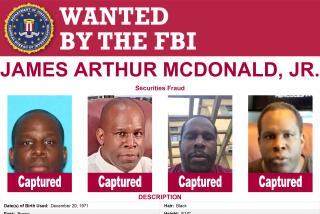Investment Firm Head Won’t Disclose Assets
- Share via
The owner of an Orange County investment firm under investigation for an alleged $813-million Ponzi scheme won’t disclose personal and business assets to federal regulators, citing the right to avoid self-incrimination, his attorney said Wednesday.
James Paul Lewis Jr. also did not show up Wednesday to answer, under oath, questions put to him by the Securities and Exchange Commission as part of its lawsuit against Lewis and his Financial Advisory Consultants.
Although no criminal charges have been filed, the FBI and the SEC allege Lewis and his firm defrauded more than 5,200 investors nationwide by using the money of later investors to pay previous clients.
A federal judge last week ordered Lewis to provide an accounting of his assets.
“Mr. Lewis, through his attorney, has asserted his 5th Amendment right against self-incrimination in response to that,” said his attorney, Douglas J. Pettibone.
Lewis couldn’t provide a complete accounting anyway, Pettibone said, because “the information necessary to respond to it was seized by the FBI,” which raided Lewis’ Lake Forest office suite last week.
SEC Associate Regional Director Sandra Harris declined to comment on Lewis’ response. She could not be reached to comment on his failure to appear for Wednesday’s deposition.
The SEC obtained a temporary restraining order against Lewis, 57, and his firm last week.
Pettibone said Lewis was hiring lawyers, accountants and investigators to respond to the SEC’s complaint, but that he was asking to withdraw as Lewis’ attorney because of a conflict of interest.
He would not disclose the nature of the conflict.
The FBI and the SEC allege that Lewis for years used money from new clients to keep old clients satisfied as he reported that his income and growth funds were growing by 20% to 40%, respectively, through good economic times and bad.
Since June, Lewis has delayed clients’ withdrawal requests with the false explanation that millions of dollars in investments had been frozen by the Department of Homeland Security.
More to Read
Inside the business of entertainment
The Wide Shot brings you news, analysis and insights on everything from streaming wars to production — and what it all means for the future.
You may occasionally receive promotional content from the Los Angeles Times.










